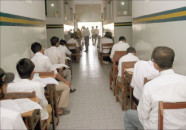Parliament is sovereign to legislate: Justice Rizvi
Notes 1972 Reforms Ordinance given legal backing in Constitution

The Supreme Court has declared that parliament is sovereign institution that can legislate on any issue.
“No article of the Constitution prevents the legislation of parliament,” a detailed verdict authored by Justice Syed Hasan Azhar Rizvi read.
The judge’s detailed judgment came on the legislative authority of parliament. However, it was taken down from the top court’s official website.
The order read that the judiciary had the power to scrutinise laws passed by parliament, adding that the superior judiciary, however, should exercise restraint on the power to scrutinise these laws.
The order stated that the power of judicial scrutiny should be exercised in such a way as to maintain harmony between the judiciary, legislature, and executive.
It continued that the power of judicial review should be exercised with restraint and wisdom.
The order read that the power of judicial scrutiny could not be used in a manner that would start a conflict between the judiciary and parliament.
It stated that the Reforms Ordinance-1972 was given legal backing in the Constitution. It added that under the ordinance, Article 199 had provided for the right of appeal under the constitutional jurisdiction of a high court.
The order pointed out that the legality of the ordinance had not been questioned even after the passage of 50 years.
It continued that the judiciary should avoid solving legal questions according to court decisions.
Justice Rizvi wrote that he disagreed with the decision of his fellow judge, Justice Jamal Khan Mandokhail, on the matter.
He added that there was no need to refer the matter to the chief justice of Pakistan for the interpretation of a legal point.
Justice Rizvi wrote the judgment in a transaction case.
Last month, heading a two-judge bench, Justice Mandokhail, had recommended that the matter of the intra-appeal under Article 199 be referred to the CJP.
However, Justice Rizvi, the other judge on the bench, had disagreed with Justice Mandokhail and written a dissenting note.
The Law Reforms Ordinance 1972 provides a remedy of appeal against the decision made upon a constitutional petition filed under Article 199 of the Constitution before a single judge.
The ordinance was promulgated on April 14, 1972 to provide a remedy of appeal from an order made by a single judge of that court in an exercise of power conferred upon it under Article 199 of the Constitution.
Justice Mandokhail had observed that the question, which needed consideration, was whether a remedy of appeal could be provided to an aggrieved person either through an ordinance or parliamentary legislation in respect of matters decided under the jurisdiction conferred upon a court under Article 199 of the Constitution in view of April 13 order wherein a larger bench had suspended a simple legislation for providing appeal against the judgements in cases filed under Article 184-3 of the Constitution.
The case had exposed the division between two sections of the SC judges.



















COMMENTS
Comments are moderated and generally will be posted if they are on-topic and not abusive.
For more information, please see our Comments FAQ